It is in the assumptions we carry to the great questions of our time that lies the determination of any course of action. These assumptions begin in the unconscious mind and move from there to the inclinations that inform our world views and our ideological commitments.
Oftentimes, these antecedent factors impinging on our commitments are unspecified when we offer policy solutions and other political courses of action. These presuppositions are so ingrained that at times we cannot understand why others fail to agree with our specific responses. The task is for us to be aware of them and able to offer sound justifications for these presuppositions. The lure of articulated ideology however seems too powerful and aimed at action, not a reflection. That is why the idea that orthopraxis precedes orthodoxy is common, especially on the left. Most people never choose the route of deeper reflection due to the lack of awareness that these questions are even important. They never even agree that their interpretive prism is tainted with a thin layer of presuppositions, preferring instead to attack those who point out the importance of that journey. These critics are said to be invested in “turning back the clock” or “impeding progress.”
When I was a communist, I learned the ideology first by osmosis and then by catechetical instruction. I questioned why others did not agree with what seemed so obvious to me. I suffered from the utopian syndrome, a condition of ecstatic wonder at having found the ultimate answer to everything. The premises were a given, not needing to be questioned. As the authors of the book Change tell us about the syndrome, “What we mean by this is that the individual (or, for that matter, a group or a whole society), when trying to order his world in accordance with his premise and seeing his attempt fail, will typically not examine the premise for any absurd or unrealistic elements of its own, or will, as we have seen, blame outside factors (e.g., society) or his own ineptitude. The idea that the fault might lie with the premises is unbearable, for the premises are the truth, are reality.”[1]
In today’s academic world, students are often taught to tint their interpretive prism with thick ideology but seldom to question why they should hold these views. The premises become axioms that serve as a matrix of understanding needing to be followed, not questioned. Questioning them, in and of itself, is seen as a lack of insight.
What is the main presupposition or assumption of our time? I believe that it is that we move in a dialectical world of antagonisms caused by oppressive forces in a perennial struggle with each other. That struggle results in the alienation of some from the dominant institutions. That basically explains everything, and our only task is to determine to which alienated (or alienating) group we belong.
This concept of alienation was developed especially by the Prussian thinker G. W. F. Hegel. Alienation suffused Hegel’s whole philosophical project but was especially present in three of his books, The Phenomenology of Spirit, Science of Logic, and the Encyclopedia of Philosophical Sciences. Hegel’s concept of alienation referred mostly to a spiritual quest within the self—where a man tries to align his consciousness with his being. In the Phenomenology of Spirit, Hegel distinguishes between ‘alienation as estrangement’ and ‘alienation as externalization.’ Man finds himself alienated from his own consciousness and then from the institutions to which he belongs but does not adhere to in his consciousness. In his seemly pantheistic vision, Hegel saw all of existence as a theology, where God experiences a sort of cosmic self-development. In his quest for self-understanding, God expresses himself in material things such as humans and history. All of material reality is an epiphenomenon of Spirit.
Karl Marx takes the general idea of alienation in Hegel and deprives it of spirituality. In that “demystification” of alienation, Marx is aided by his embrace of the concept of alienation as he found it in another Prussian thinker, Wilhelm Feuerbach.
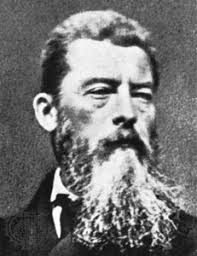 Especially in his books The Essence of Christianity and The Essence of Religion, Feuerbach understood alienation as man’s quest for meaning and ultimate peace in the creation of the idea of God to which he transfers his fears and his hopes. Man wants to be healthy but gets sick, wants to be happy but finds himself sad, wants to be free but is enslaved everywhere, wants to live forever but dies. Thus, man creates the idea of God as the source of all these goods escaping him and alienates himself from the reality of his existence, which in reality is exhausted within the material world.
Especially in his books The Essence of Christianity and The Essence of Religion, Feuerbach understood alienation as man’s quest for meaning and ultimate peace in the creation of the idea of God to which he transfers his fears and his hopes. Man wants to be healthy but gets sick, wants to be happy but finds himself sad, wants to be free but is enslaved everywhere, wants to live forever but dies. Thus, man creates the idea of God as the source of all these goods escaping him and alienates himself from the reality of his existence, which in reality is exhausted within the material world.
In Marx, alienation takes on a materialistic vision of inexorable antagonistic entanglements whose resolution necessitates a violent upheaval. What we need is not a spiritual awakening but the rejection of false consciousness to realize that in the here and now there are forces that oppress some and benefit others. Spirit is merely an epiphenomenon of the forces present in material history—the superstructure (culture, ideas, art, religion, theology) arises from the structure (politics, economics, social class). Violence becomes the instrumental cause for human advancement as a man struggles to eliminate his estrangement from reality. As those in power will never surrender their privileges, the only way to eliminate alienation is by forcing the powerful out of their privileges. We see here the transition from a purely spiritual self-alienation in Hegel to a worldly alienation of man from his environment in Marx.
In Marx’s view, alienation is found in the world, not in the spirit. It is within the antagonistic forces in the structures of society that man is separated from his true self by force. It is only by force that he can shatter these forces and move forward to a higher state of human existence. The capitalist system represented the highest alienating force in human history due to the dramatic difference of that system from previous alienating and oppressive powers.
All of life is informed by a constant battle for conquering power to change the alienating structures of society. This battle does not depend on the human will but is instead a reality of existence; thus, science is possible, according to Marx. That is why he called his system scientific dialectical materialism.
It is easy to see here that there are a number of presuppositions concerning the nature of man, the nature of social interaction, and the nature of existence itself in the ideas that prevail in our time. But we seldom question these presuppositions when speaking of “oppression” or “social justice” as taught and understood within the halls of academic knowledge. These people are presented as oppressed tokens of groups in need of liberation from an oppressive capitalist system that feeds on the perpetuation of alienation.
I learned my Marxism at home, my father being a sophisticated Marxist who studied the ideology intently. The great writers were always there for me to read—Gramsci, Marx, Lenin, Mao, Trotsky, Bakunin, Kropotkin. The interpretation, however, was provided by my father, by the party, and by Cuban newspapers, articles, and books. I never knew that there could even be an alternative viewpoint that was any other than propaganda.
When I discovered that there was in effect an alternative view, it was as if scales fell from my eyes and a completely new world appeared, one that threatened my consciousness with fearful new thoughts and an exciting opportunity that made sense to take. I’m still on that journey.
The possibility of that journey is sadly foreclosed in many of our halls of learning, as the ethos of our culture has closed itself to glimpsing new ideas beyond the ones based on Marxist presuppositions.
[1] Wtzlawick et al., Change Principles of Problem Formation and Problem Resolution (New York: W.W. Norton, 1974 1st Edition) p. 54.
Read More

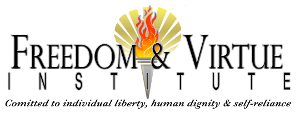

 As with pregnancy, so with societies in general. As civilization advances, risk is minimized. Even in the economic sphere, the emergence of insurance and other financial instruments has dissipated risk to a remarkable extent. Widespread wealth insulates individuals from destitution and, through charitable organizations and government institutions, insulates wider communities. In some places, the United States included, these layers of protection are so robust that the prospect of actually dying from starvation or exposure has been virtually eliminated from entire cultures. The fear of death, it would seem, recedes.
As with pregnancy, so with societies in general. As civilization advances, risk is minimized. Even in the economic sphere, the emergence of insurance and other financial instruments has dissipated risk to a remarkable extent. Widespread wealth insulates individuals from destitution and, through charitable organizations and government institutions, insulates wider communities. In some places, the United States included, these layers of protection are so robust that the prospect of actually dying from starvation or exposure has been virtually eliminated from entire cultures. The fear of death, it would seem, recedes.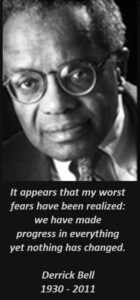 In the contention of CRT, America is an inherently and permanently racist society, whose very foundation is based on racial oppression. Race, not class, gave rise to class stratification and the alienation of “inferior” races. Consequently, America’s political, social, and legal systems are by definition racist and unjust. They are not valid and must be replaced.
In the contention of CRT, America is an inherently and permanently racist society, whose very foundation is based on racial oppression. Race, not class, gave rise to class stratification and the alienation of “inferior” races. Consequently, America’s political, social, and legal systems are by definition racist and unjust. They are not valid and must be replaced.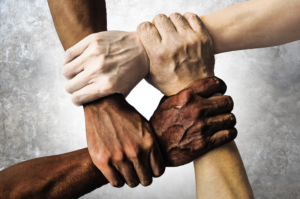 What is true at the personal level is also true at the societal level. Like individuals, cultures need reform. The cycle of corruption and reform is inherent in the human experience. In the history of Western religion, the “Reformation” and the “Counter-Reformation” were watershed events. But even before the dissolution of Catholic Europe, there were the Cluniac reforms, the Hildebrandine reforms, and many others. Contemporary American social and political life is still stamped by reform movements that arose in the late nineteenth century, such as populism and progressivism. The civil rights movement in the postwar era is properly seen as yet another reform movement in American history.
What is true at the personal level is also true at the societal level. Like individuals, cultures need reform. The cycle of corruption and reform is inherent in the human experience. In the history of Western religion, the “Reformation” and the “Counter-Reformation” were watershed events. But even before the dissolution of Catholic Europe, there were the Cluniac reforms, the Hildebrandine reforms, and many others. Contemporary American social and political life is still stamped by reform movements that arose in the late nineteenth century, such as populism and progressivism. The civil rights movement in the postwar era is properly seen as yet another reform movement in American history. This problem has been countered, more or less successfully at various times and places, by the development of alternative schooling options. Religious schools, homeschooling, and charter schools are among the options that have preserved a modicum of freedom within American education. But these and other alternatives have often struggled to find a level playing field, as the legal environment has ranged from favoring public schools (by providing full taxpayer funding) to actively discouraging nonpublic options (by, for example, burdening homeschooling with red tape or strictly limiting charter school numbers).
This problem has been countered, more or less successfully at various times and places, by the development of alternative schooling options. Religious schools, homeschooling, and charter schools are among the options that have preserved a modicum of freedom within American education. But these and other alternatives have often struggled to find a level playing field, as the legal environment has ranged from favoring public schools (by providing full taxpayer funding) to actively discouraging nonpublic options (by, for example, burdening homeschooling with red tape or strictly limiting charter school numbers).
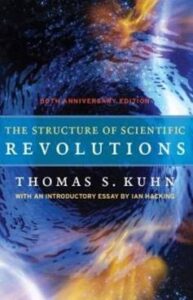 In his
In his 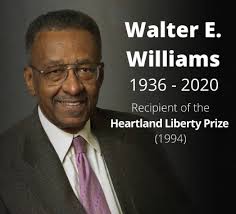 ‘Discovery commences with the awareness of anomaly, i.e., with the recognition that nature has somehow violated the paradigm-induced expectations that govern normal science.’
‘Discovery commences with the awareness of anomaly, i.e., with the recognition that nature has somehow violated the paradigm-induced expectations that govern normal science.’ As recent events demonstrate, the United States is not immune to the plague of violence and civil unrest. But it does have an exemplary record of free elections followed by peaceful transfers of power. The American system—albeit weakened by mistrust, corruption, and disrespect for the rule of law—endures. Even when we aren’t excited about an incoming administration, we can be grateful that the transition does not provoke widespread rioting, a collapse of governmental functions, or civil war. After the election of 1800, a political battle as ugly as any in American history, the victor sought to remind the nation’s citizens of their common aspirations. The words of
As recent events demonstrate, the United States is not immune to the plague of violence and civil unrest. But it does have an exemplary record of free elections followed by peaceful transfers of power. The American system—albeit weakened by mistrust, corruption, and disrespect for the rule of law—endures. Even when we aren’t excited about an incoming administration, we can be grateful that the transition does not provoke widespread rioting, a collapse of governmental functions, or civil war. After the election of 1800, a political battle as ugly as any in American history, the victor sought to remind the nation’s citizens of their common aspirations. The words of  Especially in his books
Especially in his books  Williams, who described himself as a “troublemaker,” began working honest jobs as a shoe-shine boy, in mail departments, and in commercial deliveries from a young age – too young for the law. The Labor Department ejected a 15-year-old Williams from a sewing job for working while underage. Despite its dubious legality, Williams credited his young work history for instilling the drive and habits that would take him to the heights of his profession.
Williams, who described himself as a “troublemaker,” began working honest jobs as a shoe-shine boy, in mail departments, and in commercial deliveries from a young age – too young for the law. The Labor Department ejected a 15-year-old Williams from a sewing job for working while underage. Despite its dubious legality, Williams credited his young work history for instilling the drive and habits that would take him to the heights of his profession.